International HRM Report: UK Call Centre Operations in Japan
VerifiedAdded on 2023/06/12
|12
|3145
|309
Report
AI Summary
This report provides a critical evaluation of the cultural and human resource management (HRM) issues that UK companies must consider when establishing call centre operations in Japan. It emphasizes the importance of understanding Japanese customs, values, behaviors, group solidarity, punctuality, and professionalism. The report discusses the challenges related to language and the necessity for translators. It also examines cross-cultural theories such as Hofstede's Dimensions Theory, the GLOBE project, and Trompenaars' Framework, highlighting the advantages and disadvantages of cultural diversity in the workplace. Furthermore, the report addresses HRM issues like compliance with Japanese laws, recruitment challenges, and the importance of effective communication with international clients. It also explores the application of the Organization Life Cycle Theory and General System Theory in the context of establishing and managing a call centre in Japan. Desklib offers a variety of solved assignments and past papers for students.
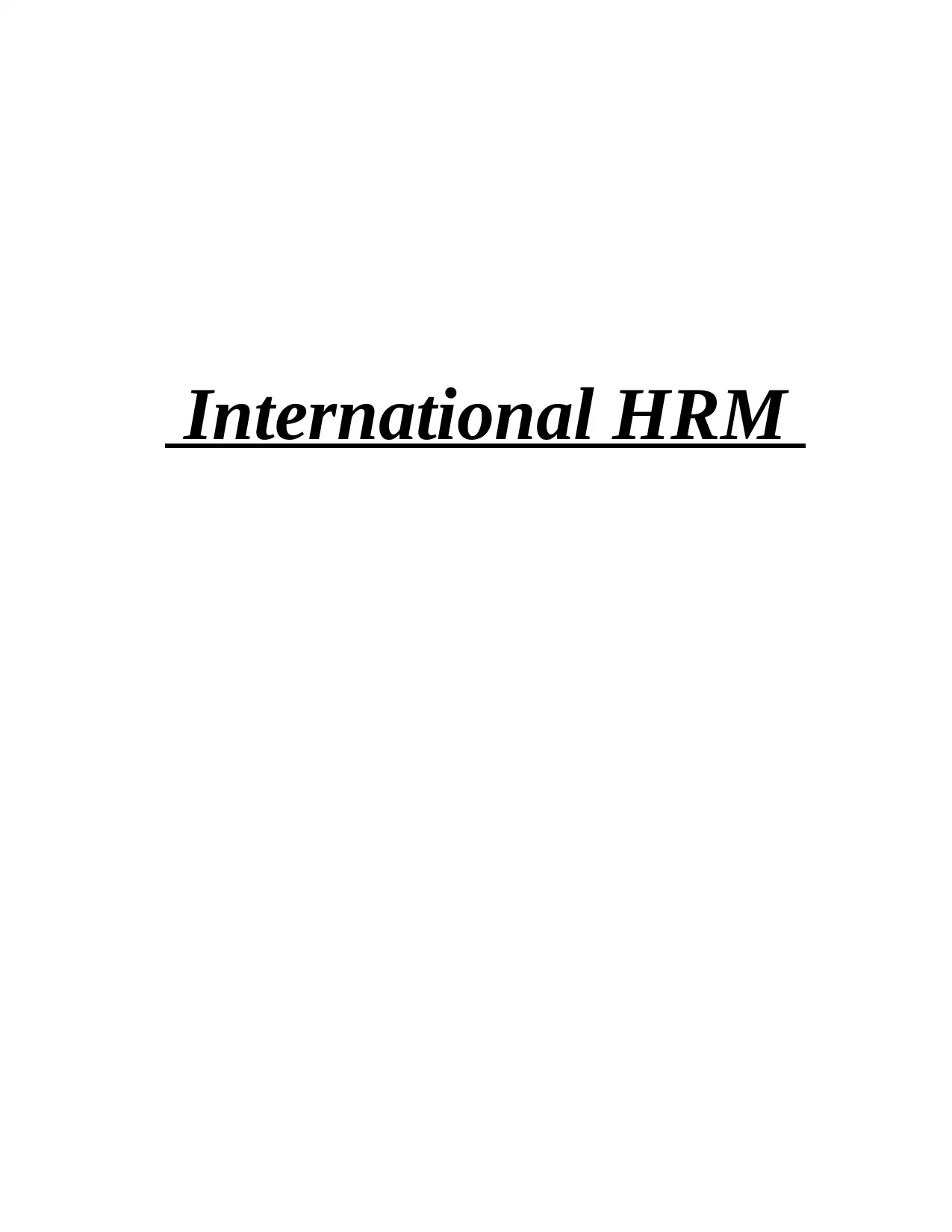
International HRM
Paraphrase This Document
Need a fresh take? Get an instant paraphrase of this document with our AI Paraphraser
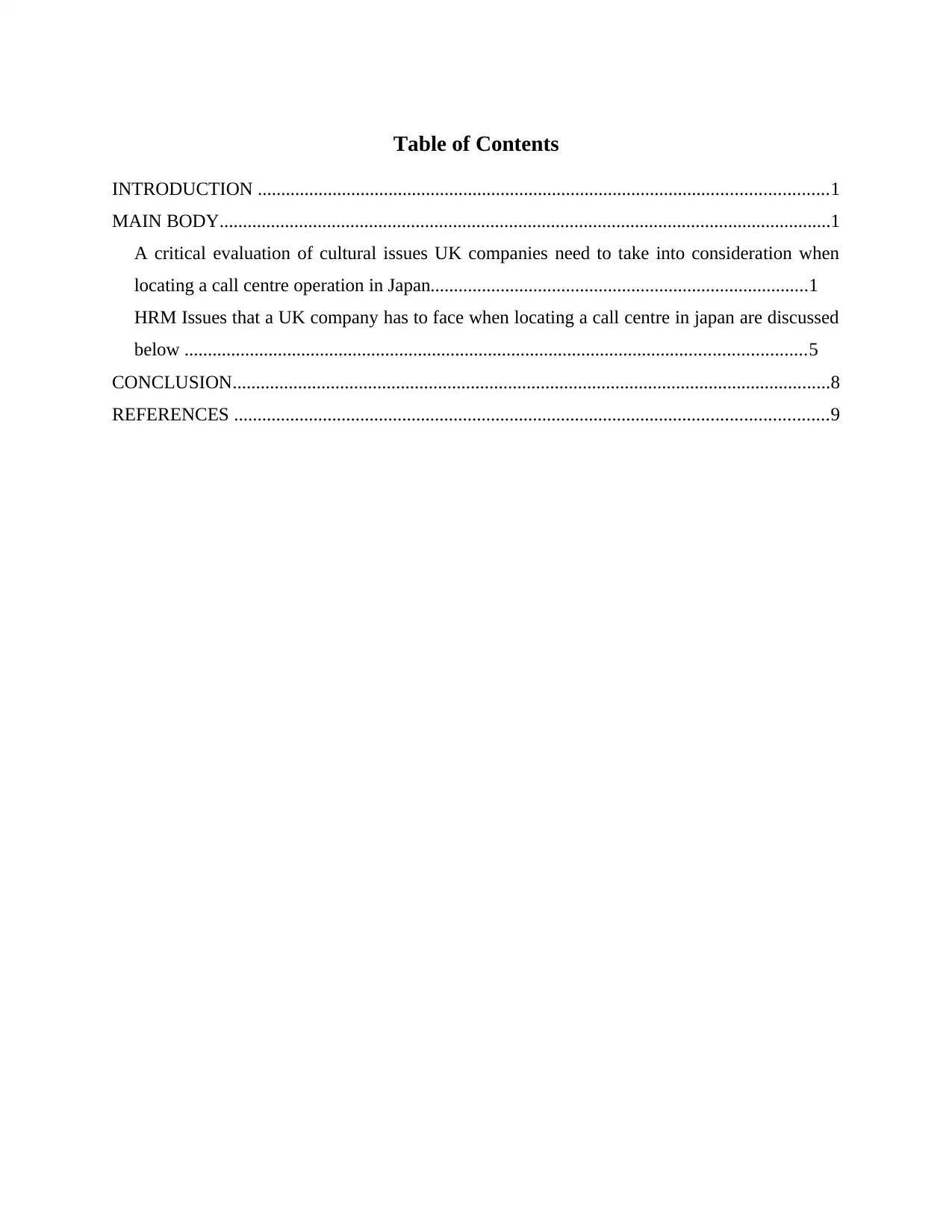
Table of Contents
INTRODUCTION ..........................................................................................................................1
MAIN BODY...................................................................................................................................1
A critical evaluation of cultural issues UK companies need to take into consideration when
locating a call centre operation in Japan.................................................................................1
HRM Issues that a UK company has to face when locating a call centre in japan are discussed
below .....................................................................................................................................5
CONCLUSION................................................................................................................................8
REFERENCES ...............................................................................................................................9
INTRODUCTION ..........................................................................................................................1
MAIN BODY...................................................................................................................................1
A critical evaluation of cultural issues UK companies need to take into consideration when
locating a call centre operation in Japan.................................................................................1
HRM Issues that a UK company has to face when locating a call centre in japan are discussed
below .....................................................................................................................................5
CONCLUSION................................................................................................................................8
REFERENCES ...............................................................................................................................9
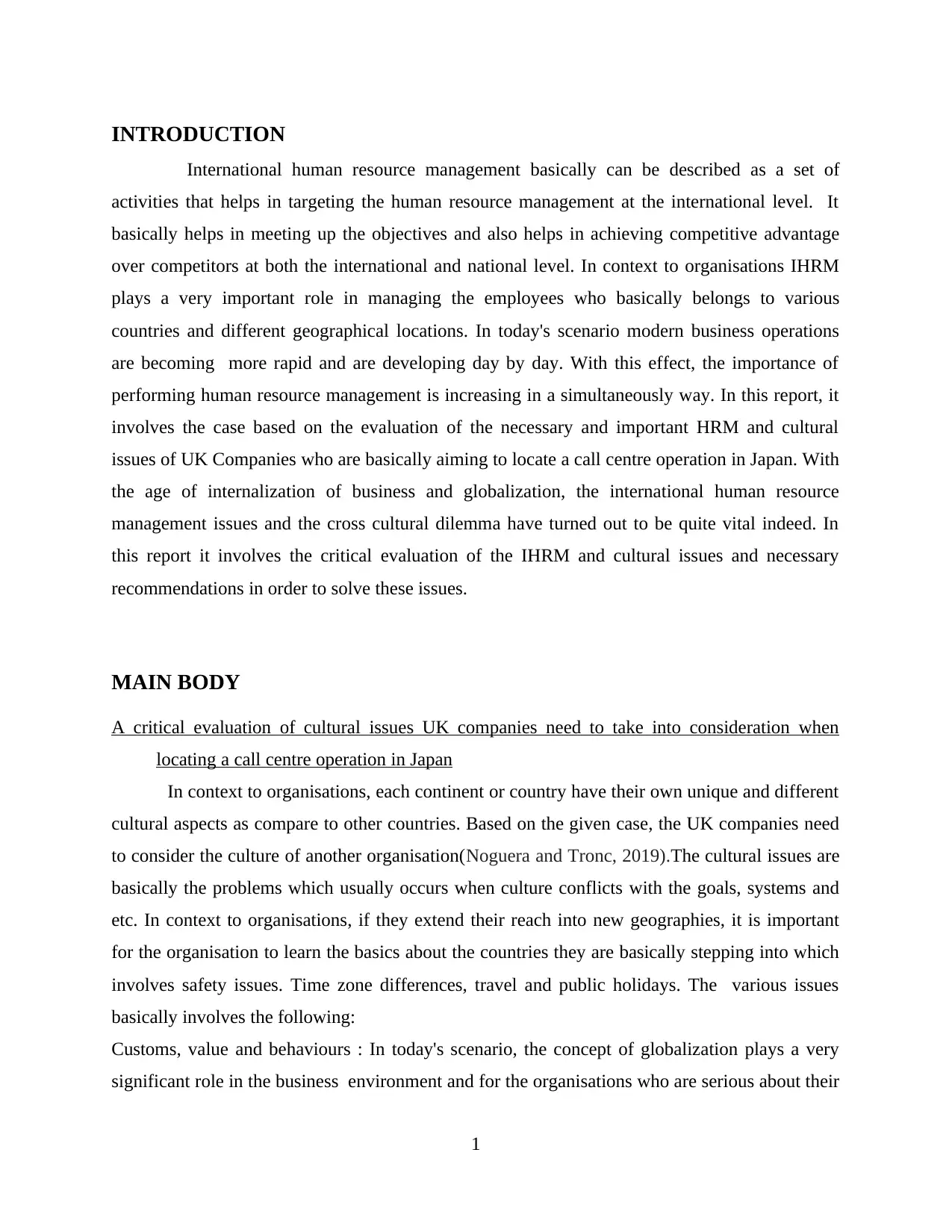
INTRODUCTION
International human resource management basically can be described as a set of
activities that helps in targeting the human resource management at the international level. It
basically helps in meeting up the objectives and also helps in achieving competitive advantage
over competitors at both the international and national level. In context to organisations IHRM
plays a very important role in managing the employees who basically belongs to various
countries and different geographical locations. In today's scenario modern business operations
are becoming more rapid and are developing day by day. With this effect, the importance of
performing human resource management is increasing in a simultaneously way. In this report, it
involves the case based on the evaluation of the necessary and important HRM and cultural
issues of UK Companies who are basically aiming to locate a call centre operation in Japan. With
the age of internalization of business and globalization, the international human resource
management issues and the cross cultural dilemma have turned out to be quite vital indeed. In
this report it involves the critical evaluation of the IHRM and cultural issues and necessary
recommendations in order to solve these issues.
MAIN BODY
A critical evaluation of cultural issues UK companies need to take into consideration when
locating a call centre operation in Japan
In context to organisations, each continent or country have their own unique and different
cultural aspects as compare to other countries. Based on the given case, the UK companies need
to consider the culture of another organisation(Noguera and Tronc, 2019).The cultural issues are
basically the problems which usually occurs when culture conflicts with the goals, systems and
etc. In context to organisations, if they extend their reach into new geographies, it is important
for the organisation to learn the basics about the countries they are basically stepping into which
involves safety issues. Time zone differences, travel and public holidays. The various issues
basically involves the following:
Customs, value and behaviours : In today's scenario, the concept of globalization plays a very
significant role in the business environment and for the organisations who are serious about their
1
International human resource management basically can be described as a set of
activities that helps in targeting the human resource management at the international level. It
basically helps in meeting up the objectives and also helps in achieving competitive advantage
over competitors at both the international and national level. In context to organisations IHRM
plays a very important role in managing the employees who basically belongs to various
countries and different geographical locations. In today's scenario modern business operations
are becoming more rapid and are developing day by day. With this effect, the importance of
performing human resource management is increasing in a simultaneously way. In this report, it
involves the case based on the evaluation of the necessary and important HRM and cultural
issues of UK Companies who are basically aiming to locate a call centre operation in Japan. With
the age of internalization of business and globalization, the international human resource
management issues and the cross cultural dilemma have turned out to be quite vital indeed. In
this report it involves the critical evaluation of the IHRM and cultural issues and necessary
recommendations in order to solve these issues.
MAIN BODY
A critical evaluation of cultural issues UK companies need to take into consideration when
locating a call centre operation in Japan
In context to organisations, each continent or country have their own unique and different
cultural aspects as compare to other countries. Based on the given case, the UK companies need
to consider the culture of another organisation(Noguera and Tronc, 2019).The cultural issues are
basically the problems which usually occurs when culture conflicts with the goals, systems and
etc. In context to organisations, if they extend their reach into new geographies, it is important
for the organisation to learn the basics about the countries they are basically stepping into which
involves safety issues. Time zone differences, travel and public holidays. The various issues
basically involves the following:
Customs, value and behaviours : In today's scenario, the concept of globalization plays a very
significant role in the business environment and for the organisations who are serious about their
1
⊘ This is a preview!⊘
Do you want full access?
Subscribe today to unlock all pages.

Trusted by 1+ million students worldwide
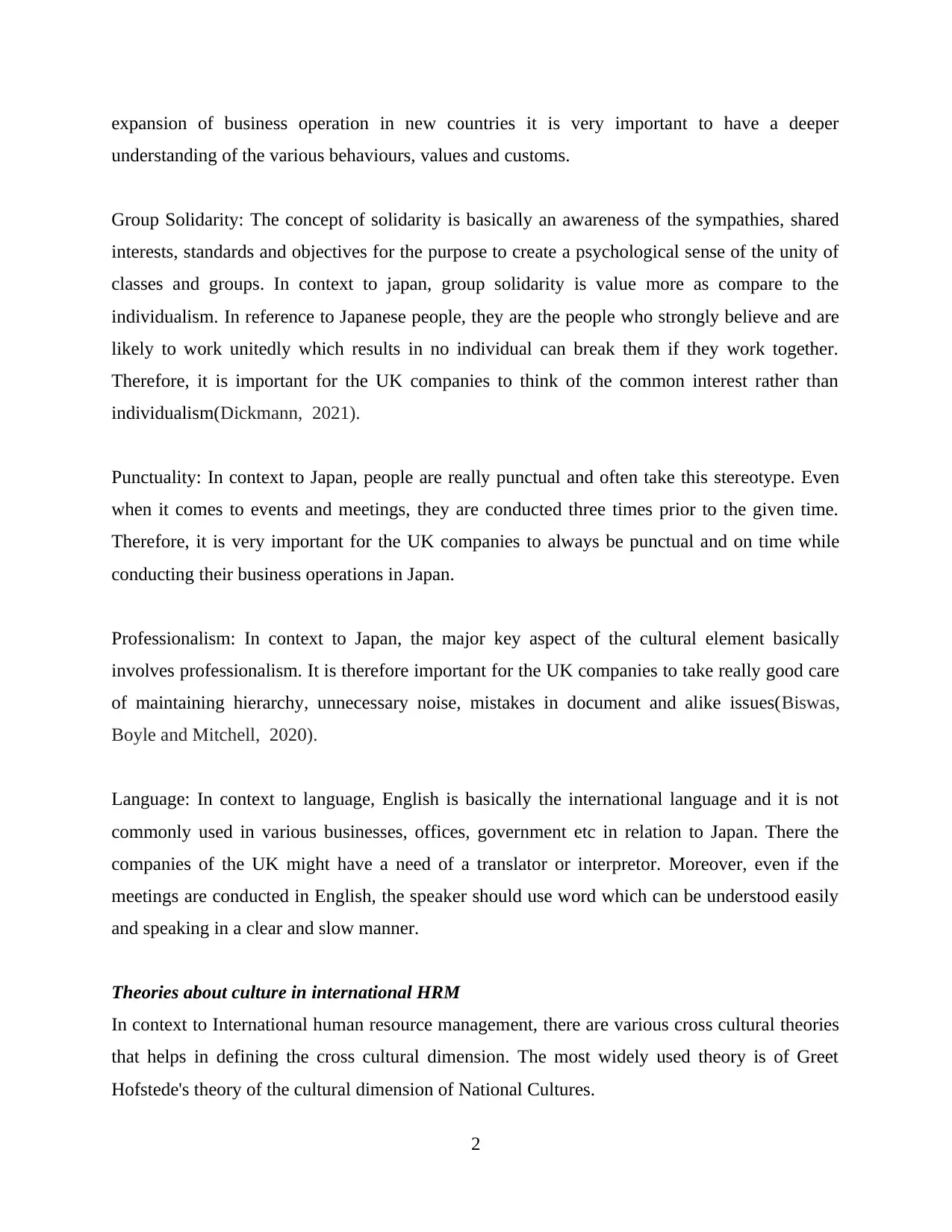
expansion of business operation in new countries it is very important to have a deeper
understanding of the various behaviours, values and customs.
Group Solidarity: The concept of solidarity is basically an awareness of the sympathies, shared
interests, standards and objectives for the purpose to create a psychological sense of the unity of
classes and groups. In context to japan, group solidarity is value more as compare to the
individualism. In reference to Japanese people, they are the people who strongly believe and are
likely to work unitedly which results in no individual can break them if they work together.
Therefore, it is important for the UK companies to think of the common interest rather than
individualism(Dickmann, 2021).
Punctuality: In context to Japan, people are really punctual and often take this stereotype. Even
when it comes to events and meetings, they are conducted three times prior to the given time.
Therefore, it is very important for the UK companies to always be punctual and on time while
conducting their business operations in Japan.
Professionalism: In context to Japan, the major key aspect of the cultural element basically
involves professionalism. It is therefore important for the UK companies to take really good care
of maintaining hierarchy, unnecessary noise, mistakes in document and alike issues(Biswas,
Boyle and Mitchell, 2020).
Language: In context to language, English is basically the international language and it is not
commonly used in various businesses, offices, government etc in relation to Japan. There the
companies of the UK might have a need of a translator or interpretor. Moreover, even if the
meetings are conducted in English, the speaker should use word which can be understood easily
and speaking in a clear and slow manner.
Theories about culture in international HRM
In context to International human resource management, there are various cross cultural theories
that helps in defining the cross cultural dimension. The most widely used theory is of Greet
Hofstede's theory of the cultural dimension of National Cultures.
2
understanding of the various behaviours, values and customs.
Group Solidarity: The concept of solidarity is basically an awareness of the sympathies, shared
interests, standards and objectives for the purpose to create a psychological sense of the unity of
classes and groups. In context to japan, group solidarity is value more as compare to the
individualism. In reference to Japanese people, they are the people who strongly believe and are
likely to work unitedly which results in no individual can break them if they work together.
Therefore, it is important for the UK companies to think of the common interest rather than
individualism(Dickmann, 2021).
Punctuality: In context to Japan, people are really punctual and often take this stereotype. Even
when it comes to events and meetings, they are conducted three times prior to the given time.
Therefore, it is very important for the UK companies to always be punctual and on time while
conducting their business operations in Japan.
Professionalism: In context to Japan, the major key aspect of the cultural element basically
involves professionalism. It is therefore important for the UK companies to take really good care
of maintaining hierarchy, unnecessary noise, mistakes in document and alike issues(Biswas,
Boyle and Mitchell, 2020).
Language: In context to language, English is basically the international language and it is not
commonly used in various businesses, offices, government etc in relation to Japan. There the
companies of the UK might have a need of a translator or interpretor. Moreover, even if the
meetings are conducted in English, the speaker should use word which can be understood easily
and speaking in a clear and slow manner.
Theories about culture in international HRM
In context to International human resource management, there are various cross cultural theories
that helps in defining the cross cultural dimension. The most widely used theory is of Greet
Hofstede's theory of the cultural dimension of National Cultures.
2
Paraphrase This Document
Need a fresh take? Get an instant paraphrase of this document with our AI Paraphraser
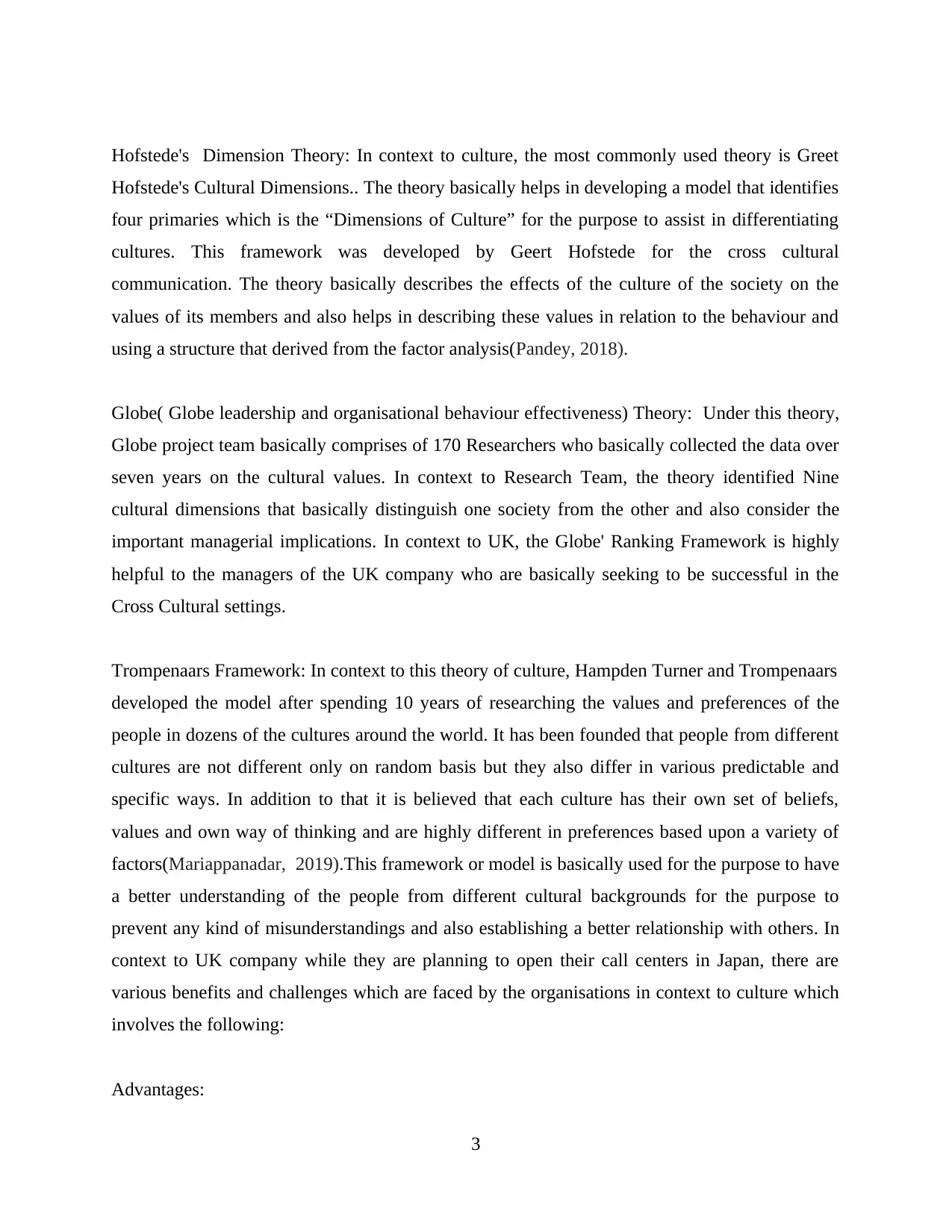
Hofstede's Dimension Theory: In context to culture, the most commonly used theory is Greet
Hofstede's Cultural Dimensions.. The theory basically helps in developing a model that identifies
four primaries which is the “Dimensions of Culture” for the purpose to assist in differentiating
cultures. This framework was developed by Geert Hofstede for the cross cultural
communication. The theory basically describes the effects of the culture of the society on the
values of its members and also helps in describing these values in relation to the behaviour and
using a structure that derived from the factor analysis(Pandey, 2018).
Globe( Globe leadership and organisational behaviour effectiveness) Theory: Under this theory,
Globe project team basically comprises of 170 Researchers who basically collected the data over
seven years on the cultural values. In context to Research Team, the theory identified Nine
cultural dimensions that basically distinguish one society from the other and also consider the
important managerial implications. In context to UK, the Globe' Ranking Framework is highly
helpful to the managers of the UK company who are basically seeking to be successful in the
Cross Cultural settings.
Trompenaars Framework: In context to this theory of culture, Hampden Turner and Trompenaars
developed the model after spending 10 years of researching the values and preferences of the
people in dozens of the cultures around the world. It has been founded that people from different
cultures are not different only on random basis but they also differ in various predictable and
specific ways. In addition to that it is believed that each culture has their own set of beliefs,
values and own way of thinking and are highly different in preferences based upon a variety of
factors(Mariappanadar, 2019).This framework or model is basically used for the purpose to have
a better understanding of the people from different cultural backgrounds for the purpose to
prevent any kind of misunderstandings and also establishing a better relationship with others. In
context to UK company while they are planning to open their call centers in Japan, there are
various benefits and challenges which are faced by the organisations in context to culture which
involves the following:
Advantages:
3
Hofstede's Cultural Dimensions.. The theory basically helps in developing a model that identifies
four primaries which is the “Dimensions of Culture” for the purpose to assist in differentiating
cultures. This framework was developed by Geert Hofstede for the cross cultural
communication. The theory basically describes the effects of the culture of the society on the
values of its members and also helps in describing these values in relation to the behaviour and
using a structure that derived from the factor analysis(Pandey, 2018).
Globe( Globe leadership and organisational behaviour effectiveness) Theory: Under this theory,
Globe project team basically comprises of 170 Researchers who basically collected the data over
seven years on the cultural values. In context to Research Team, the theory identified Nine
cultural dimensions that basically distinguish one society from the other and also consider the
important managerial implications. In context to UK, the Globe' Ranking Framework is highly
helpful to the managers of the UK company who are basically seeking to be successful in the
Cross Cultural settings.
Trompenaars Framework: In context to this theory of culture, Hampden Turner and Trompenaars
developed the model after spending 10 years of researching the values and preferences of the
people in dozens of the cultures around the world. It has been founded that people from different
cultures are not different only on random basis but they also differ in various predictable and
specific ways. In addition to that it is believed that each culture has their own set of beliefs,
values and own way of thinking and are highly different in preferences based upon a variety of
factors(Mariappanadar, 2019).This framework or model is basically used for the purpose to have
a better understanding of the people from different cultural backgrounds for the purpose to
prevent any kind of misunderstandings and also establishing a better relationship with others. In
context to UK company while they are planning to open their call centers in Japan, there are
various benefits and challenges which are faced by the organisations in context to culture which
involves the following:
Advantages:
3
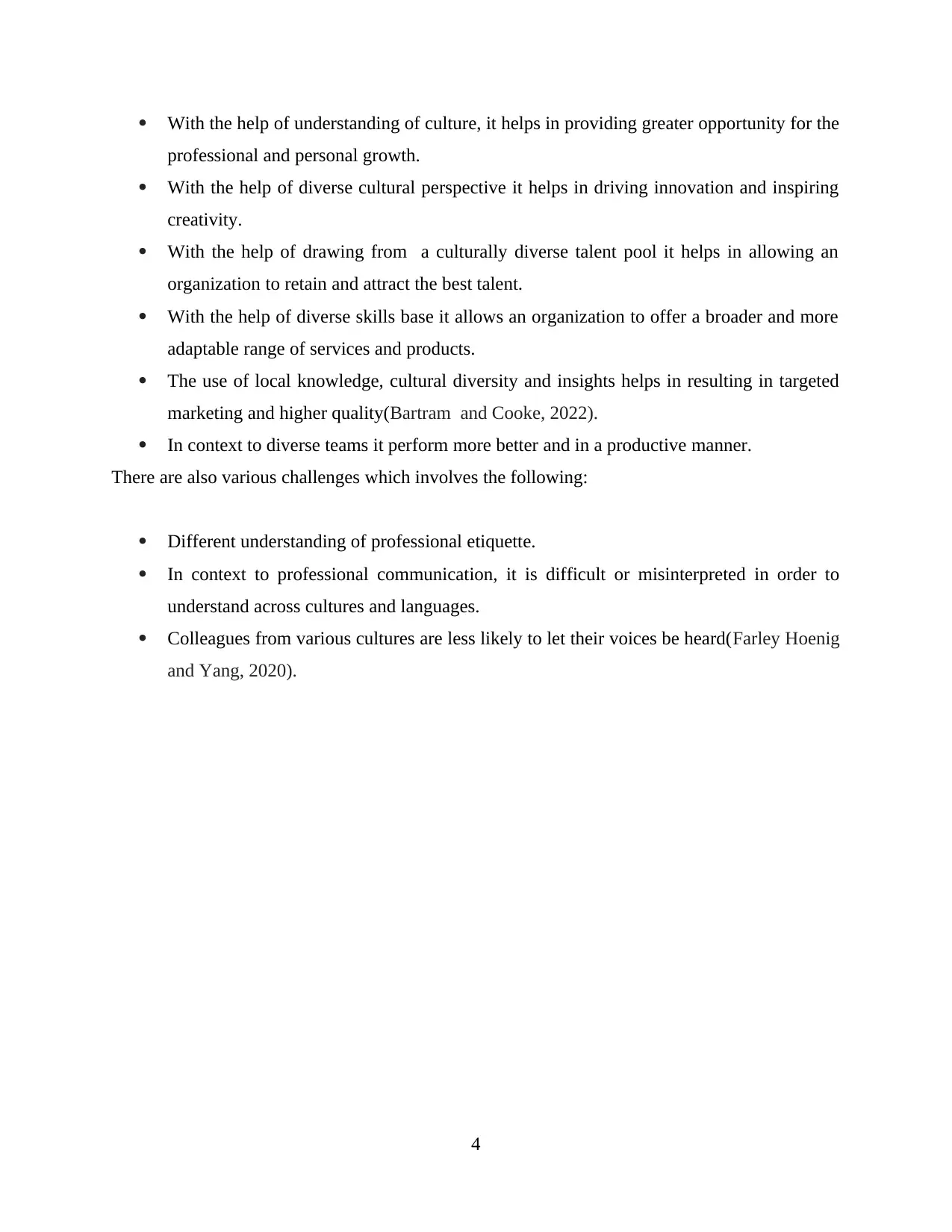
With the help of understanding of culture, it helps in providing greater opportunity for the
professional and personal growth.
With the help of diverse cultural perspective it helps in driving innovation and inspiring
creativity.
With the help of drawing from a culturally diverse talent pool it helps in allowing an
organization to retain and attract the best talent.
With the help of diverse skills base it allows an organization to offer a broader and more
adaptable range of services and products.
The use of local knowledge, cultural diversity and insights helps in resulting in targeted
marketing and higher quality(Bartram and Cooke, 2022).
In context to diverse teams it perform more better and in a productive manner.
There are also various challenges which involves the following:
Different understanding of professional etiquette.
In context to professional communication, it is difficult or misinterpreted in order to
understand across cultures and languages.
Colleagues from various cultures are less likely to let their voices be heard(Farley Hoenig
and Yang, 2020).
4
professional and personal growth.
With the help of diverse cultural perspective it helps in driving innovation and inspiring
creativity.
With the help of drawing from a culturally diverse talent pool it helps in allowing an
organization to retain and attract the best talent.
With the help of diverse skills base it allows an organization to offer a broader and more
adaptable range of services and products.
The use of local knowledge, cultural diversity and insights helps in resulting in targeted
marketing and higher quality(Bartram and Cooke, 2022).
In context to diverse teams it perform more better and in a productive manner.
There are also various challenges which involves the following:
Different understanding of professional etiquette.
In context to professional communication, it is difficult or misinterpreted in order to
understand across cultures and languages.
Colleagues from various cultures are less likely to let their voices be heard(Farley Hoenig
and Yang, 2020).
4
⊘ This is a preview!⊘
Do you want full access?
Subscribe today to unlock all pages.

Trusted by 1+ million students worldwide
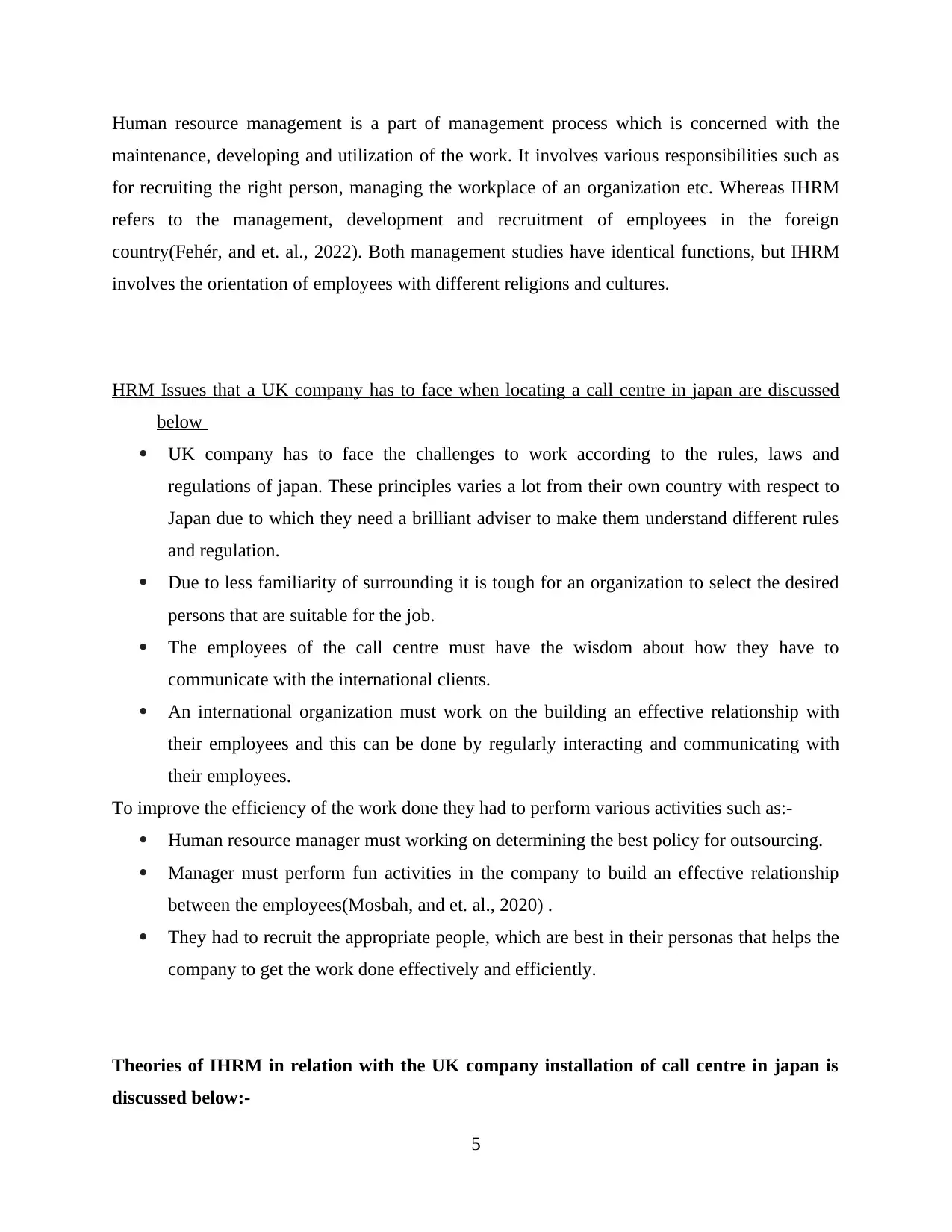
Human resource management is a part of management process which is concerned with the
maintenance, developing and utilization of the work. It involves various responsibilities such as
for recruiting the right person, managing the workplace of an organization etc. Whereas IHRM
refers to the management, development and recruitment of employees in the foreign
country(Fehér, and et. al., 2022). Both management studies have identical functions, but IHRM
involves the orientation of employees with different religions and cultures.
HRM Issues that a UK company has to face when locating a call centre in japan are discussed
below
UK company has to face the challenges to work according to the rules, laws and
regulations of japan. These principles varies a lot from their own country with respect to
Japan due to which they need a brilliant adviser to make them understand different rules
and regulation.
Due to less familiarity of surrounding it is tough for an organization to select the desired
persons that are suitable for the job.
The employees of the call centre must have the wisdom about how they have to
communicate with the international clients.
An international organization must work on the building an effective relationship with
their employees and this can be done by regularly interacting and communicating with
their employees.
To improve the efficiency of the work done they had to perform various activities such as:-
Human resource manager must working on determining the best policy for outsourcing.
Manager must perform fun activities in the company to build an effective relationship
between the employees(Mosbah, and et. al., 2020) .
They had to recruit the appropriate people, which are best in their personas that helps the
company to get the work done effectively and efficiently.
Theories of IHRM in relation with the UK company installation of call centre in japan is
discussed below:-
5
maintenance, developing and utilization of the work. It involves various responsibilities such as
for recruiting the right person, managing the workplace of an organization etc. Whereas IHRM
refers to the management, development and recruitment of employees in the foreign
country(Fehér, and et. al., 2022). Both management studies have identical functions, but IHRM
involves the orientation of employees with different religions and cultures.
HRM Issues that a UK company has to face when locating a call centre in japan are discussed
below
UK company has to face the challenges to work according to the rules, laws and
regulations of japan. These principles varies a lot from their own country with respect to
Japan due to which they need a brilliant adviser to make them understand different rules
and regulation.
Due to less familiarity of surrounding it is tough for an organization to select the desired
persons that are suitable for the job.
The employees of the call centre must have the wisdom about how they have to
communicate with the international clients.
An international organization must work on the building an effective relationship with
their employees and this can be done by regularly interacting and communicating with
their employees.
To improve the efficiency of the work done they had to perform various activities such as:-
Human resource manager must working on determining the best policy for outsourcing.
Manager must perform fun activities in the company to build an effective relationship
between the employees(Mosbah, and et. al., 2020) .
They had to recruit the appropriate people, which are best in their personas that helps the
company to get the work done effectively and efficiently.
Theories of IHRM in relation with the UK company installation of call centre in japan is
discussed below:-
5
Paraphrase This Document
Need a fresh take? Get an instant paraphrase of this document with our AI Paraphraser
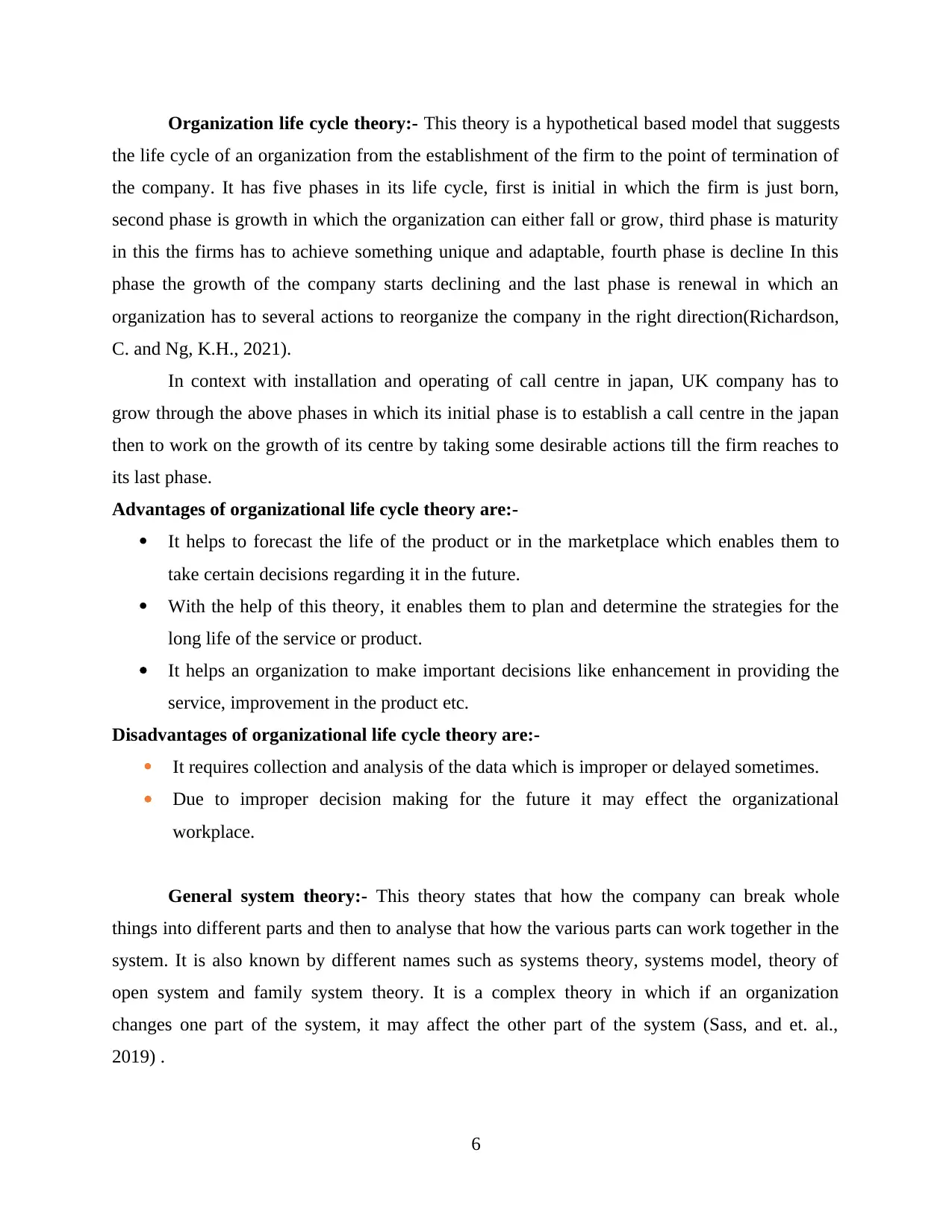
Organization life cycle theory:- This theory is a hypothetical based model that suggests
the life cycle of an organization from the establishment of the firm to the point of termination of
the company. It has five phases in its life cycle, first is initial in which the firm is just born,
second phase is growth in which the organization can either fall or grow, third phase is maturity
in this the firms has to achieve something unique and adaptable, fourth phase is decline In this
phase the growth of the company starts declining and the last phase is renewal in which an
organization has to several actions to reorganize the company in the right direction(Richardson,
C. and Ng, K.H., 2021).
In context with installation and operating of call centre in japan, UK company has to
grow through the above phases in which its initial phase is to establish a call centre in the japan
then to work on the growth of its centre by taking some desirable actions till the firm reaches to
its last phase.
Advantages of organizational life cycle theory are:-
It helps to forecast the life of the product or in the marketplace which enables them to
take certain decisions regarding it in the future.
With the help of this theory, it enables them to plan and determine the strategies for the
long life of the service or product.
It helps an organization to make important decisions like enhancement in providing the
service, improvement in the product etc.
Disadvantages of organizational life cycle theory are:-
It requires collection and analysis of the data which is improper or delayed sometimes.
Due to improper decision making for the future it may effect the organizational
workplace.
General system theory:- This theory states that how the company can break whole
things into different parts and then to analyse that how the various parts can work together in the
system. It is also known by different names such as systems theory, systems model, theory of
open system and family system theory. It is a complex theory in which if an organization
changes one part of the system, it may affect the other part of the system (Sass, and et. al.,
2019) .
6
the life cycle of an organization from the establishment of the firm to the point of termination of
the company. It has five phases in its life cycle, first is initial in which the firm is just born,
second phase is growth in which the organization can either fall or grow, third phase is maturity
in this the firms has to achieve something unique and adaptable, fourth phase is decline In this
phase the growth of the company starts declining and the last phase is renewal in which an
organization has to several actions to reorganize the company in the right direction(Richardson,
C. and Ng, K.H., 2021).
In context with installation and operating of call centre in japan, UK company has to
grow through the above phases in which its initial phase is to establish a call centre in the japan
then to work on the growth of its centre by taking some desirable actions till the firm reaches to
its last phase.
Advantages of organizational life cycle theory are:-
It helps to forecast the life of the product or in the marketplace which enables them to
take certain decisions regarding it in the future.
With the help of this theory, it enables them to plan and determine the strategies for the
long life of the service or product.
It helps an organization to make important decisions like enhancement in providing the
service, improvement in the product etc.
Disadvantages of organizational life cycle theory are:-
It requires collection and analysis of the data which is improper or delayed sometimes.
Due to improper decision making for the future it may effect the organizational
workplace.
General system theory:- This theory states that how the company can break whole
things into different parts and then to analyse that how the various parts can work together in the
system. It is also known by different names such as systems theory, systems model, theory of
open system and family system theory. It is a complex theory in which if an organization
changes one part of the system, it may affect the other part of the system (Sass, and et. al.,
2019) .
6
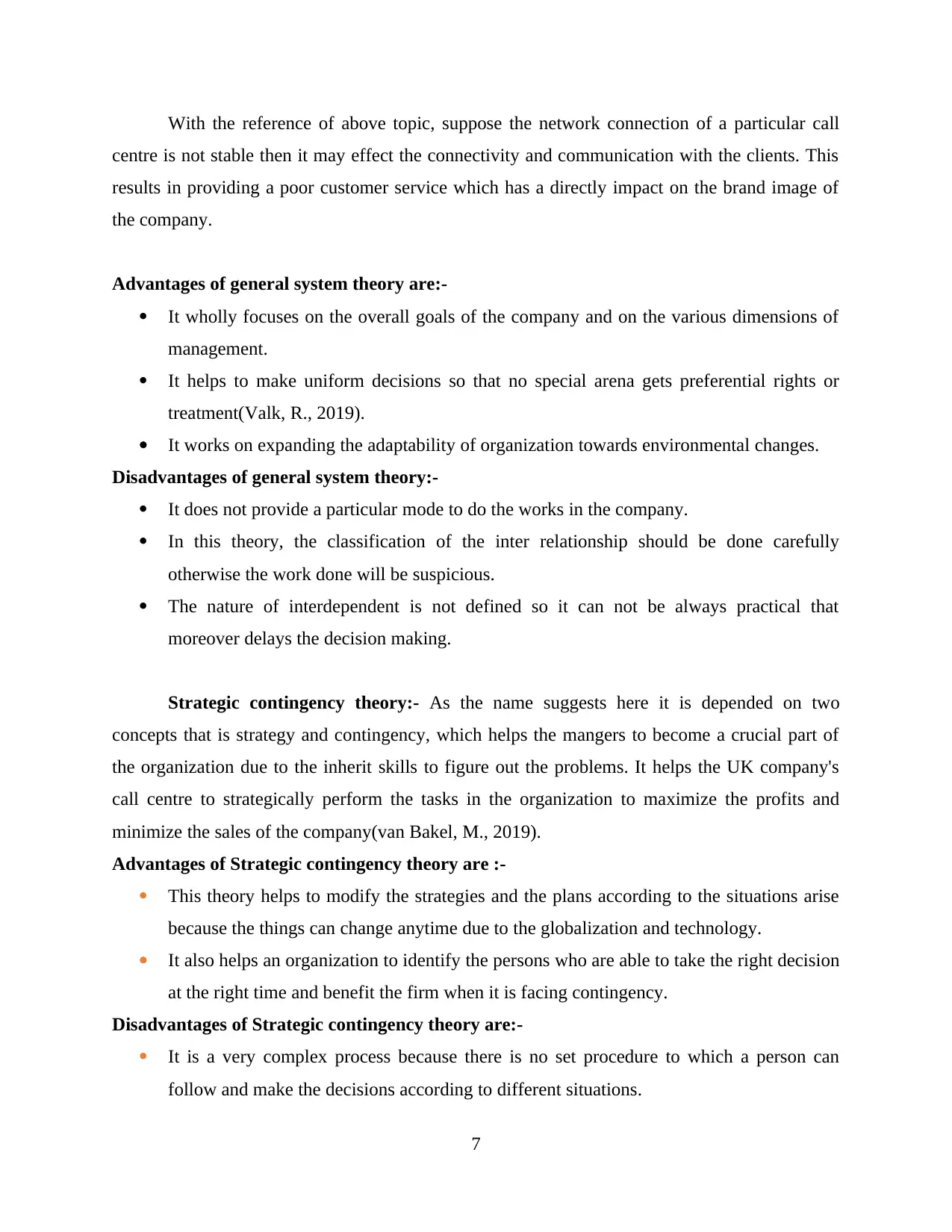
With the reference of above topic, suppose the network connection of a particular call
centre is not stable then it may effect the connectivity and communication with the clients. This
results in providing a poor customer service which has a directly impact on the brand image of
the company.
Advantages of general system theory are:-
It wholly focuses on the overall goals of the company and on the various dimensions of
management.
It helps to make uniform decisions so that no special arena gets preferential rights or
treatment(Valk, R., 2019).
It works on expanding the adaptability of organization towards environmental changes.
Disadvantages of general system theory:-
It does not provide a particular mode to do the works in the company.
In this theory, the classification of the inter relationship should be done carefully
otherwise the work done will be suspicious.
The nature of interdependent is not defined so it can not be always practical that
moreover delays the decision making.
Strategic contingency theory:- As the name suggests here it is depended on two
concepts that is strategy and contingency, which helps the mangers to become a crucial part of
the organization due to the inherit skills to figure out the problems. It helps the UK company's
call centre to strategically perform the tasks in the organization to maximize the profits and
minimize the sales of the company(van Bakel, M., 2019).
Advantages of Strategic contingency theory are :-
This theory helps to modify the strategies and the plans according to the situations arise
because the things can change anytime due to the globalization and technology.
It also helps an organization to identify the persons who are able to take the right decision
at the right time and benefit the firm when it is facing contingency.
Disadvantages of Strategic contingency theory are:-
It is a very complex process because there is no set procedure to which a person can
follow and make the decisions according to different situations.
7
centre is not stable then it may effect the connectivity and communication with the clients. This
results in providing a poor customer service which has a directly impact on the brand image of
the company.
Advantages of general system theory are:-
It wholly focuses on the overall goals of the company and on the various dimensions of
management.
It helps to make uniform decisions so that no special arena gets preferential rights or
treatment(Valk, R., 2019).
It works on expanding the adaptability of organization towards environmental changes.
Disadvantages of general system theory:-
It does not provide a particular mode to do the works in the company.
In this theory, the classification of the inter relationship should be done carefully
otherwise the work done will be suspicious.
The nature of interdependent is not defined so it can not be always practical that
moreover delays the decision making.
Strategic contingency theory:- As the name suggests here it is depended on two
concepts that is strategy and contingency, which helps the mangers to become a crucial part of
the organization due to the inherit skills to figure out the problems. It helps the UK company's
call centre to strategically perform the tasks in the organization to maximize the profits and
minimize the sales of the company(van Bakel, M., 2019).
Advantages of Strategic contingency theory are :-
This theory helps to modify the strategies and the plans according to the situations arise
because the things can change anytime due to the globalization and technology.
It also helps an organization to identify the persons who are able to take the right decision
at the right time and benefit the firm when it is facing contingency.
Disadvantages of Strategic contingency theory are:-
It is a very complex process because there is no set procedure to which a person can
follow and make the decisions according to different situations.
7
⊘ This is a preview!⊘
Do you want full access?
Subscribe today to unlock all pages.

Trusted by 1+ million students worldwide
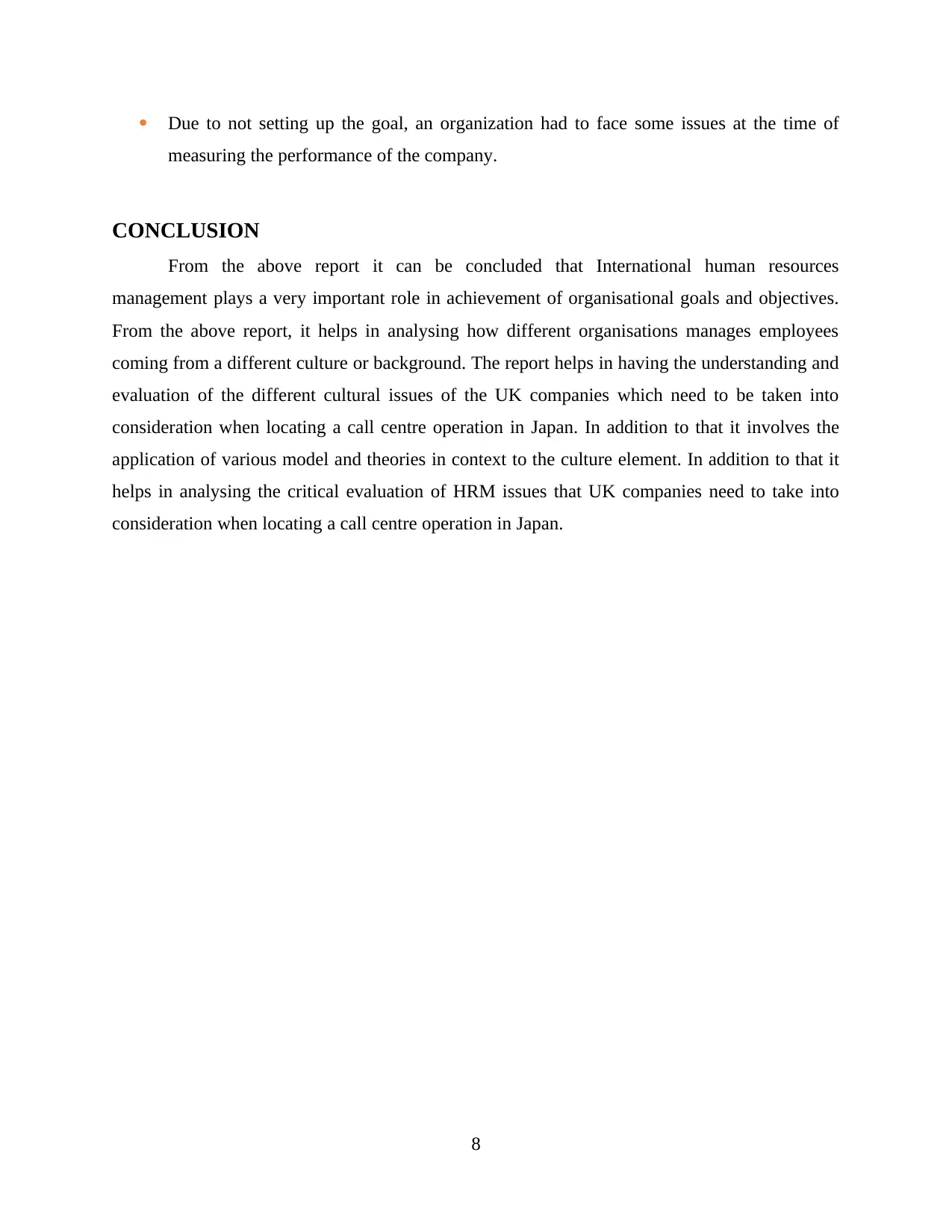
Due to not setting up the goal, an organization had to face some issues at the time of
measuring the performance of the company.
CONCLUSION
From the above report it can be concluded that International human resources
management plays a very important role in achievement of organisational goals and objectives.
From the above report, it helps in analysing how different organisations manages employees
coming from a different culture or background. The report helps in having the understanding and
evaluation of the different cultural issues of the UK companies which need to be taken into
consideration when locating a call centre operation in Japan. In addition to that it involves the
application of various model and theories in context to the culture element. In addition to that it
helps in analysing the critical evaluation of HRM issues that UK companies need to take into
consideration when locating a call centre operation in Japan.
8
measuring the performance of the company.
CONCLUSION
From the above report it can be concluded that International human resources
management plays a very important role in achievement of organisational goals and objectives.
From the above report, it helps in analysing how different organisations manages employees
coming from a different culture or background. The report helps in having the understanding and
evaluation of the different cultural issues of the UK companies which need to be taken into
consideration when locating a call centre operation in Japan. In addition to that it involves the
application of various model and theories in context to the culture element. In addition to that it
helps in analysing the critical evaluation of HRM issues that UK companies need to take into
consideration when locating a call centre operation in Japan.
8
Paraphrase This Document
Need a fresh take? Get an instant paraphrase of this document with our AI Paraphraser
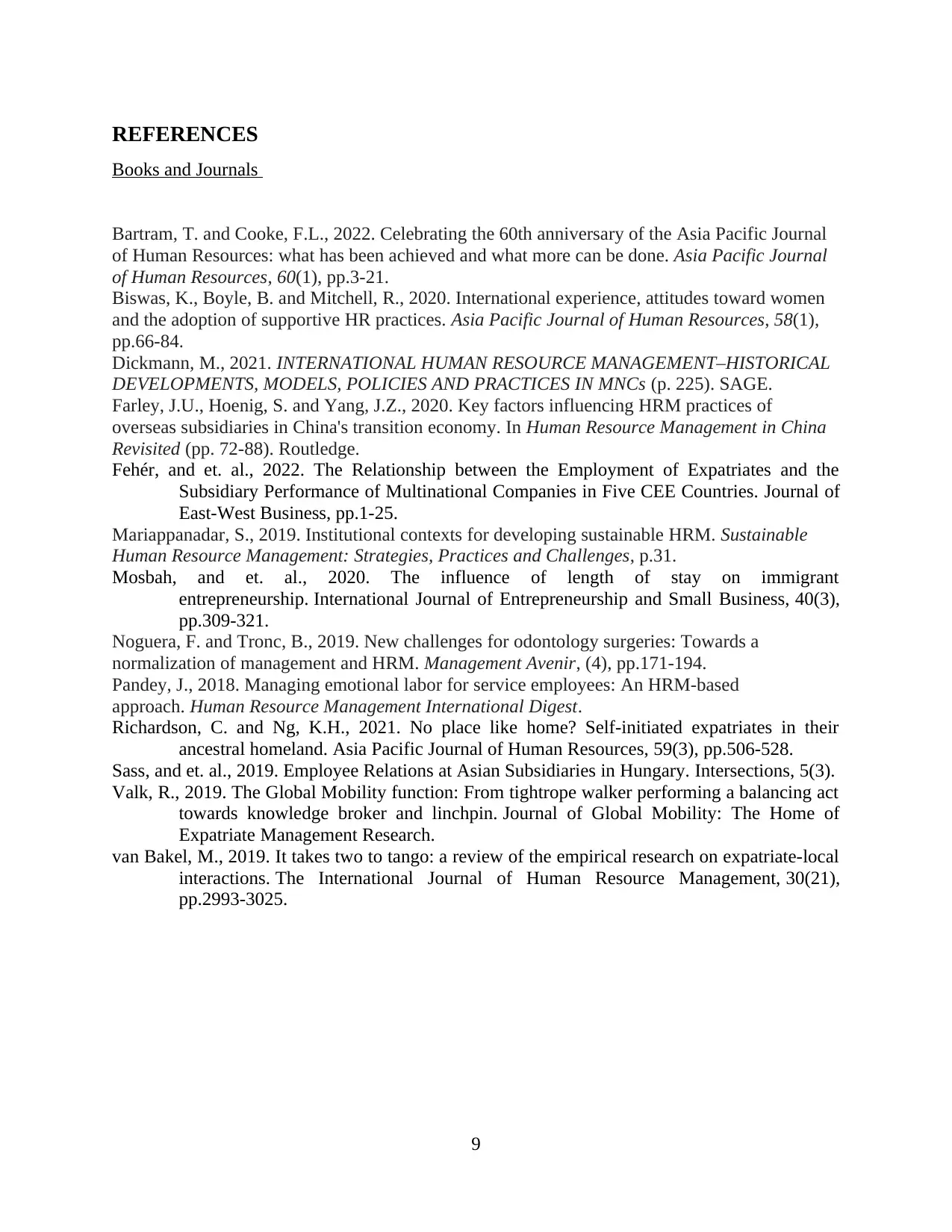
REFERENCES
Books and Journals
Bartram, T. and Cooke, F.L., 2022. Celebrating the 60th anniversary of the Asia Pacific Journal
of Human Resources: what has been achieved and what more can be done. Asia Pacific Journal
of Human Resources, 60(1), pp.3-21.
Biswas, K., Boyle, B. and Mitchell, R., 2020. International experience, attitudes toward women
and the adoption of supportive HR practices. Asia Pacific Journal of Human Resources, 58(1),
pp.66-84.
Dickmann, M., 2021. INTERNATIONAL HUMAN RESOURCE MANAGEMENT–HISTORICAL
DEVELOPMENTS, MODELS, POLICIES AND PRACTICES IN MNCs (p. 225). SAGE.
Farley, J.U., Hoenig, S. and Yang, J.Z., 2020. Key factors influencing HRM practices of
overseas subsidiaries in China's transition economy. In Human Resource Management in China
Revisited (pp. 72-88). Routledge.
Fehér, and et. al., 2022. The Relationship between the Employment of Expatriates and the
Subsidiary Performance of Multinational Companies in Five CEE Countries. Journal of
East-West Business, pp.1-25.
Mariappanadar, S., 2019. Institutional contexts for developing sustainable HRM. Sustainable
Human Resource Management: Strategies, Practices and Challenges, p.31.
Mosbah, and et. al., 2020. The influence of length of stay on immigrant
entrepreneurship. International Journal of Entrepreneurship and Small Business, 40(3),
pp.309-321.
Noguera, F. and Tronc, B., 2019. New challenges for odontology surgeries: Towards a
normalization of management and HRM. Management Avenir, (4), pp.171-194.
Pandey, J., 2018. Managing emotional labor for service employees: An HRM-based
approach. Human Resource Management International Digest.
Richardson, C. and Ng, K.H., 2021. No place like home? Self‐initiated expatriates in their
ancestral homeland. Asia Pacific Journal of Human Resources, 59(3), pp.506-528.
Sass, and et. al., 2019. Employee Relations at Asian Subsidiaries in Hungary. Intersections, 5(3).
Valk, R., 2019. The Global Mobility function: From tightrope walker performing a balancing act
towards knowledge broker and linchpin. Journal of Global Mobility: The Home of
Expatriate Management Research.
van Bakel, M., 2019. It takes two to tango: a review of the empirical research on expatriate-local
interactions. The International Journal of Human Resource Management, 30(21),
pp.2993-3025.
9
Books and Journals
Bartram, T. and Cooke, F.L., 2022. Celebrating the 60th anniversary of the Asia Pacific Journal
of Human Resources: what has been achieved and what more can be done. Asia Pacific Journal
of Human Resources, 60(1), pp.3-21.
Biswas, K., Boyle, B. and Mitchell, R., 2020. International experience, attitudes toward women
and the adoption of supportive HR practices. Asia Pacific Journal of Human Resources, 58(1),
pp.66-84.
Dickmann, M., 2021. INTERNATIONAL HUMAN RESOURCE MANAGEMENT–HISTORICAL
DEVELOPMENTS, MODELS, POLICIES AND PRACTICES IN MNCs (p. 225). SAGE.
Farley, J.U., Hoenig, S. and Yang, J.Z., 2020. Key factors influencing HRM practices of
overseas subsidiaries in China's transition economy. In Human Resource Management in China
Revisited (pp. 72-88). Routledge.
Fehér, and et. al., 2022. The Relationship between the Employment of Expatriates and the
Subsidiary Performance of Multinational Companies in Five CEE Countries. Journal of
East-West Business, pp.1-25.
Mariappanadar, S., 2019. Institutional contexts for developing sustainable HRM. Sustainable
Human Resource Management: Strategies, Practices and Challenges, p.31.
Mosbah, and et. al., 2020. The influence of length of stay on immigrant
entrepreneurship. International Journal of Entrepreneurship and Small Business, 40(3),
pp.309-321.
Noguera, F. and Tronc, B., 2019. New challenges for odontology surgeries: Towards a
normalization of management and HRM. Management Avenir, (4), pp.171-194.
Pandey, J., 2018. Managing emotional labor for service employees: An HRM-based
approach. Human Resource Management International Digest.
Richardson, C. and Ng, K.H., 2021. No place like home? Self‐initiated expatriates in their
ancestral homeland. Asia Pacific Journal of Human Resources, 59(3), pp.506-528.
Sass, and et. al., 2019. Employee Relations at Asian Subsidiaries in Hungary. Intersections, 5(3).
Valk, R., 2019. The Global Mobility function: From tightrope walker performing a balancing act
towards knowledge broker and linchpin. Journal of Global Mobility: The Home of
Expatriate Management Research.
van Bakel, M., 2019. It takes two to tango: a review of the empirical research on expatriate-local
interactions. The International Journal of Human Resource Management, 30(21),
pp.2993-3025.
9

10
⊘ This is a preview!⊘
Do you want full access?
Subscribe today to unlock all pages.

Trusted by 1+ million students worldwide
1 out of 12
Related Documents
Your All-in-One AI-Powered Toolkit for Academic Success.
+13062052269
info@desklib.com
Available 24*7 on WhatsApp / Email
![[object Object]](/_next/static/media/star-bottom.7253800d.svg)
Unlock your academic potential
Copyright © 2020–2026 A2Z Services. All Rights Reserved. Developed and managed by ZUCOL.





